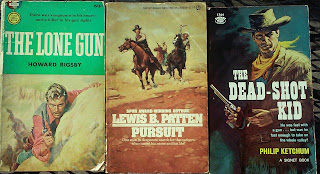 |
| Bantam Books - February 1981 |
The Mountain Valley War by Louis L'Amour is the 2nd of 5 novels to feature Kilkenny. It was first published in 1978. I had no idea this book is part of a series and it really doesn't matter. It can be read as a standalone without having read the first Kilkenny book, The Rider of Lost Creek.
A group of settlers have laid claim to land in the Idaho hills. Unfortunately, in the nearby town of Cedar Bluff resides one King Bill Hale. Hale is one of those ruthless, greedy bastards who has gone through life having his own way. He owns the town and the law and now has his sights set on the acres staked outside Cedar Bluff. His son, Cub Hale, is a psychopath who gets his kicks killing anyone who slights him. That he's not in prison is evidence of King Bill Hale's influence. Nita Reardon runs the gambling hall and saloon. She and Kilkenny have a backstory that's not elaborated on in this novel. It's obvious that she's in love with Kilkenny and has followed him to this territory. Lance Kilkenny is the "loner" gunman, wishing only to live in solitude and peace. He has no taste for killing and has hung up his guns for the peaceful life of a rancher. These characters are all western archetypes and the basic plot of the novel has been told thousands of times. L'Amour's strength is the way he can describe action and settings, and this book has plenty of both. From a hidden valley to a fistfight. There are a number of shootouts and a brutal prize-fight at the town fair, described in great detail.
A few years ago I got a stack of Louis L'Amour westerns from a pile of books left at the office. No one else seemed interested in them, so it was up to me to take them home. I've read maybe a dozen L'Amour novels and find them all enjoyable for what they are, old-fashioned stories of good guys and bad guys in the old west. This one differs a bit from the others I've read in that this time around L'Amour has chosen to pad his story with a lot, and I do mean a lot, of exposition. We know who the bad guys are not because of the bad things they do, but because L'Amour tells us, repeatedly, they're bad guys. Same with the good guys, all described as good and honest and hard working men who built the west with their good and honest hard work. L'Amour has also salted the plot with a lot history lessons, often to the point of slowing the momentum. You just want to see the bad guys eat lead without all the by-the-way historical detail. It's strange because I don't recall any other L'Amour novels I've read with so much authorial intrusion. Usually his stories are lean, and mean, trimmed of unnecessary filler.
Still, I enjoyed the book and looked forward to the final showdown, even if I already knew how everything would turn out.










